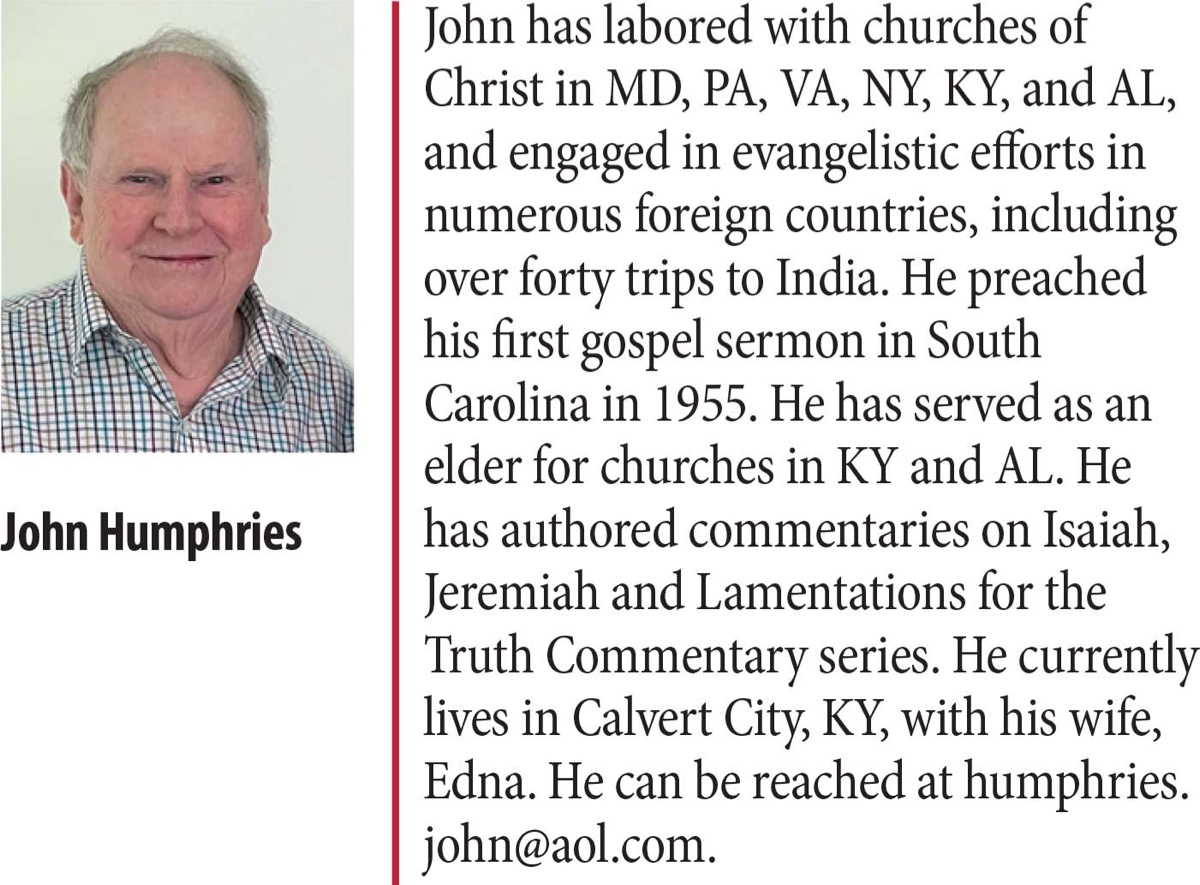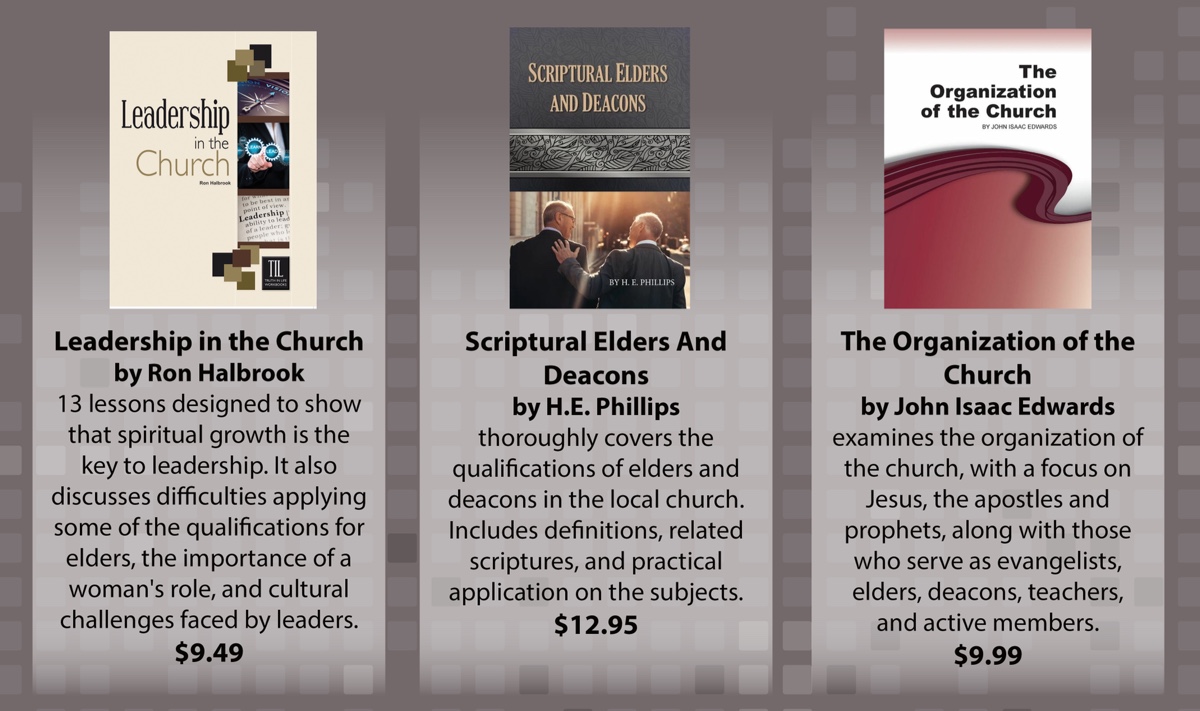
by John Humphries
Synopsis: Advancing age brings a unique set of challenges. The writer of Ecclesiastes describes this process poetically (12:1-8); brother Humphries addresses it practically and personally.
The golden years (or sunset years) can be a very challenging time in an elderly preacher’s life. With most, their bodies have been weakened by age, so that they no longer have the energy to move about as quickly as when they were younger. With some, their mind remains clear and they are free of the dementia that afflicts so many in their later years. Such elderly men can still teach Bible classes and preach God’s word. Some can still write timely articles and even books. They have years of experience and solid maturity in the Scriptures that they can still share. Some are fortunate enough to work with congregations along with a younger man and be a real blessing to the church. Elderly preachers, who also serve as elders, may effectively labor with their respective congregations for many years.
There may come a time, however, when a man’s mind and body are just not up to the effort required to present a lesson. His voice may not hold out or his mind may not be clear enough to teach or preach. When this becomes evident, mature brethren must handle the matter with patience, gentleness, and wisdom by bringing in others who can teach and preach. It is also hoped that the elderly preacher himself will have the wisdom and humility to realize that he needs to remain seated and allow others to “take the plow” and carry on.
It is difficult to accept that, after sixty or more years of labor, one’s preaching and teaching days are over. Some sink into melancholy and depression, dwelling upon the perception that they have been “put on the shelf” by the brethren. This feeling is intensified if one is never called upon to teach a class, preach a lesson here or there, or write an article, etc. Wise and discerning brethren will understand this and use an elderly preacher to the extent that his limited abilities and strength will allow. Aged men often have something to share spiritually. Brethren should use them as much as possible. Sadly, some elderly preachers who could contribute are not being called upon. Wonderful knowledge, mature wisdom, and many years of experience are not being utilized. Of course, good judgment must be employed, and every circumstance taken into consideration by wise and caring brethren. Yet, sometimes this is not done.
Some men only want to retire and visit with family, friends, or travel here and there. That is their decision, of course. This writer (hopefully along with others) would encourage such men to set aside some of their time to take a turn at teaching classes or preaching a lesson. Write an article now and then for the bulletin or some paper. Please don’t quit completely. As long as your mind is clear, share your accumulated knowledge and years of experience with the brethren. It will be a blessing to them and will also honor our Lord.
This writer, along with other elderly preachers in similar situations, lost a beloved wife of over half a century. This is certainly a difficult time in the life of an elderly preacher. The one with whom their children were brought into the world and raised into adulthood is missing. The dear companion, with whom the good times and the bad were shared, and painfully endured, is gone. Through thick and thin, she was a blessed help meet as various challenges faced the family. When she is gone, loneliness, emptiness, and sorrow that cannot be adequately expressed often accompany the daily recollections of the heart. The only thing that makes her passing bearable is the knowledge that she is in a better place. Even after years have gone by, tears still fall at times.
Some who have lost their mates remarry. This can be a restorative experience for the elderly man of God. Often, the remarriage is with a sister in Christ that has lost her husband through death. Two spiritually mature Christians can make this a beautiful union that will benefit and bless both parties. Yet, they need to proceed carefully and wisely before entering marriage late in life. There are important issues to be considered both prayerfully and carefully. Where will they live? What will they do with houses and properties? Will there be sufficient financial resources to sustain the marriage? Will the children and grandchildren accept this change and properly adjust to the new family situation? Much wisdom and patience may be required. Wills may also need revision, and prenuptial agreements may need to be prepared. Are there “living wills” that each party understands and accepts?
Also, there must be the realization that people at this age have lived as they have for many years. Elderly individuals can be “set in their ways” and not like change. They have habits, likes and dislikes, liberal or conservative views, travel or no travel opinions, certain foods at mealtime, late or early risers, early or late nights, and a host of other traits, habits, and characteristics that may pose potential problems. What about pets, and visits with (or from) children and grandchildren? What about babysitting the great grandchildren? Obviously, there will always be some areas where mature, thoughtful people will have different feelings and preferences. Usually, these can be worked out, or at least brought to a mutual understanding and agreement, and thus will not prevent the marriage from being a blessed success. Both parties must exercise wisdom and (with candor and honesty) talk it over carefully, before the marriage, in order to prevent painful disagreements, hurt feelings, and misunderstandings later on. Flexibility and patience with each other are vital!
An elderly preacher and his wife may be on social security at this stage in their lives. If both agree and are able, this can lead to the decision to seek a small congregation that cannot fully support a preacher with family to work with them. The elderly preacher and his wife would not require a large salary to meet their financial needs and thus can work with the small church. This idea is not for everyone, but it is a potential solution for a small congregation and an elderly evangelist and his wife, if all are interested, willing, and able.
Since aged individuals conclude that they only have a few years left before departing this life, they may wish to be near some of their children or grandchildren so that their family can offer help. This can be a wise decision. It may hinge upon what must be done if one or both are to be placed in a special facility that is adequate to care for them. These are always hard decisions for a loving family. While some may be cared for at home, there are medical circumstances where this is not possible and the elderly need specialized care. This writer’s wife had amyotrophic lateral sclerosis (ALS) which eventually became far too complicated to be handled at home. She returned home from the facility under Hospice Care and passed on the very next day. All elderly preachers and their wives need to give this some serious thought and planning with their children (Pss. 39:4; 90:12).
Elderly preachers can be a wonderful source of information concerning past issues that have affected churches across the nation. They can share their experiences with younger brethren who are interested in hearing what they have to say. Older preachers can discuss what brethren did back then that was unwise, or just plain wrong, in dealing with various issues. These are mistakes that God’s people should avoid in dealing with a divisive issue that may come along. On the other hand, the elderly preacher can recall what the brethren did that was right and helpful in dealing with troublesome issues that arise. They can make some helpful observations regarding what should have been done. If handled properly, this can greatly benefit younger brethren. Please note, however, that bitterness, jealousy, and resentment are never helpful! Such discussions must not become a gripe session!
There are important lessons to learn from the history of past major divisions among God’s people. These older preachers who lived and preached through those divisive times can have valuable observations concerning them. Some of them can relate their personal (and sometimes painful) experiences and what they learned from such. Churches and families experienced division, brethren who had been friends for many years were alienated, while some became bitter enemies, etc. Faithful men who stood for the truth were quarantined. Some were fired. Indeed, God’s people have faced turbulent times in the past. Elderly preachers, looking back, may have some wise counsel for younger preachers to remember when preventive, timely preaching is needful. This writer has heard elderly preachers sound warnings in gospel meetings regarding signs of spiritual weakness here and there that they are observing. Sometimes, the warnings given went unheeded and a little later, the church (where the writer heard the warning from the elderly preacher) had a division.
Over the years, elderly preachers often build sizable libraries. Some keep their books until they pass away. Some wish to either sell their libraries or donate books to younger preachers or a school. Others invite younger preachers to pick out books they would like to have and use. This writer chose this method of disposing of his library. The only request was that those who took the books (some of which were very expensive sets) would eventually donate them to a younger preacher when they became elderly preachers! Of course, many now utilize digital libraries instead of having an extensive collection of printed materials lining bookshelves. Their electronic library resides on their computer or phone, and the internet is their research domain.
Should an elderly preacher find himself in a situation where he is not teaching or preaching, he should still keep his mind active. It is not healthy for the mind to be idle and unengaged. If one does not have opportunities to teach or preach, then find something to challenge the brain. Perhaps he might study another language, lead a small group Bible study, start a journal, or write about his past preaching and life experiences. I highly recommend that seniors keep their minds active and not become sedentary. Sitting around watching TV, or doing nothing that mentally stimulates the mind, may encourage dementia—or even Alzheimer’s disease.
If possible, elderly preachers and other seniors should take a walk every day and also be careful about their weight. Since our body is the “temple of the Holy Spirit” (1 Cor. 6:19), we should take care of ourselves physically, and try to remain as healthy as possible.
An elderly preacher (if able and interested) probably would be a skilled teacher for a class that trains the men of the congregation to make announcements, head the Lord’s table, lead prayer, or make a talk, etc. The elderly preacher can draw from his many years of preaching experience to make the class not only interesting but very profitable. Even if he did not do the active leading and teaching of the class, he could still sit in and be an excellent source of information to supplement the lessons.
Some churches that have a good number of their elderly members confined at home or in nursing facilities would do well to engage or employ an elderly preacher who is no longer “in the pulpit” on a weekly basis. He could visit these permanent shut-ins, making their days at home or in the nursing facilities more pleasant with his timely visits. Of course, such a commitment should not be considered a substitute for other members fulfilling their responsibility to visit sick or indigent brethren (Matt. 25:36).
As an elderly preacher moves nearer and nearer to the sunset, he should have the same sentiment as the aged apostle Paul: “For I am now ready to be offered, and the time of my departure is at hand. I have fought a good fight, I have finished my course, I have kept the faith: Henceforth there is laid up for me a crown of righteousness, which the Lord, the righteous judge, shall give me at that day: and not to me only, but unto all them also that love his appearing” (2 Tim. 4:6-8). May this be the sentiment of us all. 



